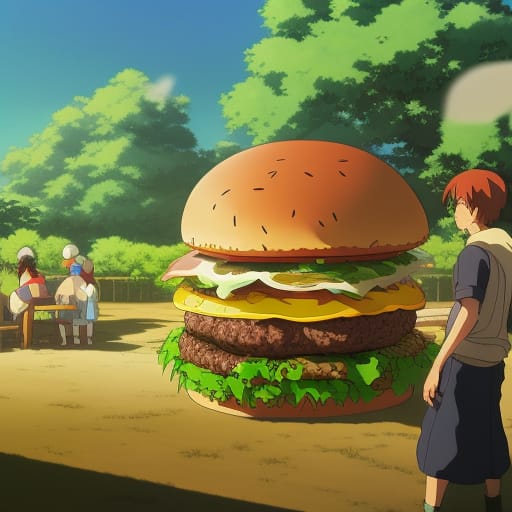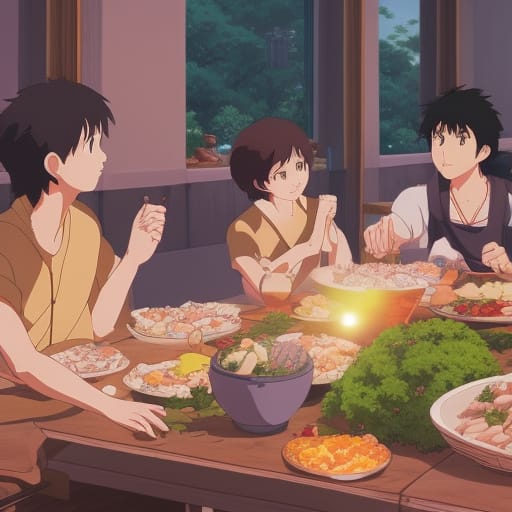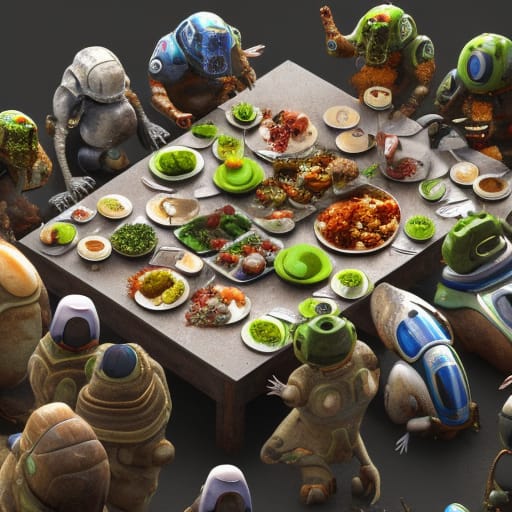Post Food Scarcity
What would the world look like if food was never a concern?

Maybe I haven't been reading the right books,
Maybe I haven't been watching the right movies or shows,
Oddly enough, I do see it a bit more in video games,
But for some reason a very crucial component to worldbuilding seems to be an afterthought in most fiction I've consumed. And I am talking about the most consumable of consumables: Good Food.
Not just the protagonist ate something, that's boring. I want to know what the texture was like, the aromas, seasoning, cooking techniques, how it compared to previous meals, what memories did it evoke, how does the food tie into the culture, what makes this a unique experience to the individual? Fantasy just doesn't feel alive without food to flesh out the local culture.
Life revolves so much around food that can be quite shocking how food is just acknowledged and glanced over in most fiction. Maybe that's just the world we live in now. Is food a mere inconvenience to living? Just something you have to do to stay alive? I don't really think so. The popularity of cooking shows, cookbooks, travel blogs, and social media chefs tell me one thing:
PEOPLE LOVE GOOD FOOD!!!
....when they are willing to put the effort into it.
And with that in mind, we can frame this post into two sections: Food for the pursuit of enrichment, and food for the sake of necessity.
But first, the basics:
What does it mean to live in a post food scarcity world? How will solving that problem affect our daily lives? How can we balance our need to feed with that of the rest of the world?
Let’s start at the top. Post-food scarcity means that food should always be available when you need it. That does not mean food is abundant everywhere but that the means, production, and logistics have been optimized to ensure that very little planning or effort is needed to ensure that you do not go hungry. Just need to make sure your (or the community) pantry doesn't run out before the next meal... so place your orders in time.
Leaving money out of the scenario (purposefully), how will we ensure enough food is being generated, without being too wasteful?
As discussed in the last blog post, AI can be our friend here. The more we sharpen our automation tools, the better we'll get at demand planning, just in time logistics, and efficient use of space. Biosphere specific staples can be managed and grown en masse through vertical gardens (both above and below ground) for most plants, and cultivated fields for anything else that requires space. Exact spatial requirements, nutritional needs, and plant variety will vary from region to region and the communities they serve so I'm not going to dig too far into the weeds on this one, but with sufficient planning we can ensure that enough staple food crops are grown for a range of communities to meet their base line needs.
Small scale farming operations should help reduce the amount of land that the world depends on for growing food. In addition, also help diversify the types of staple crops that support each region or group of communities. The abundance of small-scale farming operations should help reduce dependence on any one particular region to produce enough to feed a global population. Any excess produced can always be traded with other communities for their regional specific crops which can be easily integrated within an open travel society.

Part 1: Lets Make It Taste Good
Now that we've established baseline level of staple crops that can support a region of communities, we can start to inject a bit of flavor into each one. While most of the main food production will/can be automated, it will be left to the local communities to grow any non-staple crops such as herbs, exotic (non-native) crops, animals/fish, and/or goods synthesized from staple crops. While it is tempting to want to produce all goods, for all people, all the time, it really takes away from the uniqueness that can be developed from having to make do with what you have.
Not having access to a globalized food supply forces one to really take the time to get to know their region, the foods that grow best there, how they grow best, the best way to prepare those foods, and injects a small bit of pride into having something that is uniquely region specific. It encourages experimentation when you restrict the selection and with that communities will quickly start to develop their own flavor. It will encourage travel between communities as people will want to explore and share with others their own culinary delights and explorations, which can only serve to deepen and enrich the role that food serves in our life.
Personally, I'm always willing to travel to find and try new foods, new cooking techniques, new experiences, and in talking about all of this I've just made myself hungry.

Part 2: Just Let Me Eat
I do recognize that not everyone shares my fascination with food. To some, they just want to eat and move on with their life. They have other matters that demand their attention and it serves them naught to think too much about food. And I get it. I've been there too. If I could just drink a smoothie, take a pill, gnaw on a.. food cube(?) and that does the trick, I probably would about half the time. It takes time to produce a good meal. It takes time to develop the techniques to properly prepare something. It takes time to really get to know an ingredient. It takes time that some people just do not have.
So let’s get creative. We can easily take some of the excess staple crops produced and extract from them their most essential components for sustaining life. Bundle that all together in an easy to (swallow/chew/drink?) form and have that as an option for anyone in too much of a hurry. Or better yet, as a sort of emergency ration. Something quick and easy to travel with and that will keep well for extended periods of time. Might be hard to create a one size fits all approach but should be possible given a length of time.
There is also another approach that we can consider here. The task of cooking does not purely have to be left up to the individual. The idea of a shared community kitchen is one that I have kicked around for a while and possibly romanticized in my head. A shared kitchen where the majority of the food for a community can be stored, prepped, and served to the community at large. The task of cooking can fall upon individuals that are willing to accept that role or rotated out as determined what is best for the community. Community kitchens can even host chefs from other communities that are willing to travel and share their culinary talents with others. In a way, the community gets to bond over food, people come together, and together they can self-organize in a way that works best for them.
Everyone gets fed and can quickly go back to their tasks if need be. Or everyone takes the time to bond over a good meal.
Part Extra: The extras
There is one other thing that is worth mentioning, the seasonality of ingredients. This approach is not completely foolproof and will rely on some degree of knowing how to prep and store food so that it can be used over longer periods of time. It's my own personal philosophy that knowing how to prep food and feed yourself well are essential components to living your life. The sharing of best practices on how to accomplish that should be freely available to anyone that is interested in learning (as all information should be) and it is up to the individual to tune into their body and their needs to ensure that they are taking care of themselves. Not all food is going to be available all the time. Learning what each season will bring and how to stretch that supply for as long as possible is something that will need to be handled by the individual and/or community.
I believe technology is best utilized when it allows us to have our needs met within reach, but not put right into our hand. At some point we do have to draw a line where the use of technology encroaches upon the human experience and diminishes the experiences we can get out of life. You get to learn a lot about yourself through cooking, more so when you are cooking for a diverse group. Life doesn't hold much excitement if you only focus on the lowest common denominator of needs. It needs to be diverse and chocked full of new and wild experiences. It needs room for experimentation. It needs uniqueness and spice. I think this approach does just that.
Well that = that. Are there any points that you feel need further explaining? Anything you feel was missed? Am I just dead wrong? Would love to hear any questions, feedback, encouragement, etc. that you may have, so feel free to reach out! Also, please subscribe to the mailing list if you haven't already. It's the best way to stay up to date with the latest posts.
Thanks for reading! :)
